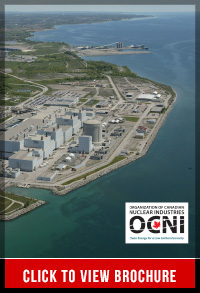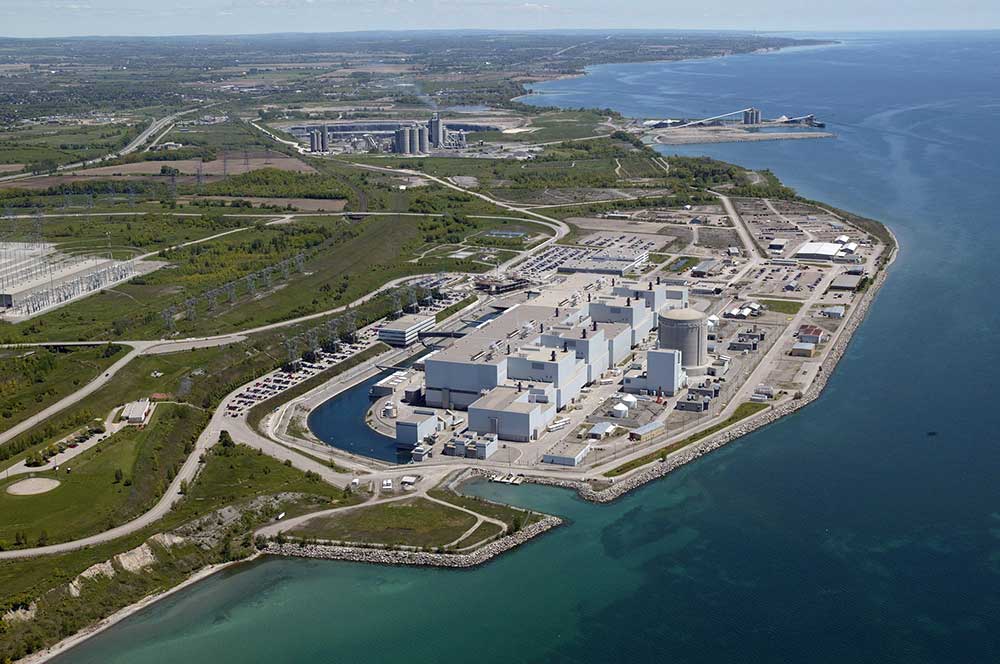Clean Energy For a Low Carbon Economy
By Anna Guy
 In early 2016, the Ontario provincial government committed $12.8 billion for the refurbishment at the Darlington Generating Station, one month after committing $13 billion to refurbish six of eight Bruce Power nuclear reactors in Kincardine, Ontario. Both investments combined are estimated to contribute billions of dollars back in the economy, create over ten thousand new jobs, and reduce the average cost of electricity for Ontario households.
In early 2016, the Ontario provincial government committed $12.8 billion for the refurbishment at the Darlington Generating Station, one month after committing $13 billion to refurbish six of eight Bruce Power nuclear reactors in Kincardine, Ontario. Both investments combined are estimated to contribute billions of dollars back in the economy, create over ten thousand new jobs, and reduce the average cost of electricity for Ontario households.
Minister of Energy, Bob Chiarelli, said at the time, “Proceeding with the refurbishment at Darlington will ensure that nuclear continues to be Ontario’s single largest source of power. The Darlington refurbishment project will create up to 11,800 jobs annually and contribute $15 billion to Ontario’s GDP. Continuing operations at Pickering will protect 4,500 jobs across the Durham region, provide emissions-free electricity, and save Ontario electricity consumers up to $600 million.”
A few quick facts to put Nuclear energy into context in Ontario, and Canada. Statistics given out by the Ontario government confirm that the Pickering Generating Station is the largest employer in Durham Region, employing directly and indirectly about 4,500 people. Continuing operations at Pickering Generating Station will avoid 8 million tonnes of greenhouse gas emissions, which is the equivalent to taking 490,000 cars off Ontario roads. Nuclear energy plays a fundamental role in Ontario’s electricity system. Ontario’s nuclear fleet currently supplies enough power to meet about 60 per cent of Ontario’s daily electricity needs, and is our largest source of reliable, affordable power.
OCNI
The Canadian Nuclear energy industry could not exist without the small, medium, and large companies who provide services and equipment to nuclear industry both in Canada and offshore. The Organization of Canadian Nuclear Industries, or OCNI, is an industry association that represents 240-member companies—the heart of the nuclear industry—that supply equipment and services to CANDU and other nuclear power plants in Canada and offshore. The OCNI has four strategic focuses: Member Connection, Supplier Readiness, Global Reach, and Advocacy.
“It will take committed effort from supply chain to deliver and install the reactor components and skilled resources to undertake these major projects,” says Dr. Ron Oberth, President and CEO of OCNI. Oberth has worked in the Canadian nuclear industry for more than 30 years at Ontario Hydro, Ontario Hydro International, Ontario Power Generation and the former AECL Reactor Division (now SNC-Lavalin/ Candu Energy), and has been OCNI CEO since 2011.
“Our vision is to lead and strengthen a Canadian nuclear supply chain, and our mission is to promote Canadian nuclear industry for the benefit of our members by offering services that enable them to be successful in Canada and global markets.”
Business Elite Canada spoke with Oberth two days after his return from Winnipeg where he attended the Generation Energy conference, an initiative started by Canada’s Minister of Natural Resources, the Honourable Jim Carr, to create a national dialogue on Canada’s path to a low-carbon future.
There, he represented OCNI member companies who make up a vital piece to Canada’s clean energy future—for instance, by helping to avoid approximately 45 million tonnes of CO2 emitted each year, Ontario’s nuclear fleet is a significant contributor to the province meeting its climate change goals. “Our view is that nuclear has an important role to play in clean energy future, reliable base load non-carbon emitting source of generation,” says Oberth. “Nuclear has a role to play along with renewables, wind and solar. We think we need an intelligent generation mix to ensure that Ontario and Canada have a reliable, affordable, and clean energy future.”
“OCNI supports its members in achieving and maintaining of the competency and capability to be good suppliers. We do this by assisting members in developing the quality programs they need to work in the nuclear industry – specifically through organizing a series of workshops on topics such as human performance, safety culture, and advanced manufacturing and robotics… all topics they need to embrace in order to be competent suppliers to our industry.”
OCNI supports members in offshore markets as well, with trade missions to countries like China, India, South Korea, Romania, USA and the UK in recent years “In those markets we help our members connect with local customers and bring them into local situations where they can perhaps secure offshore contracts,” says Oberth, who notes that OCNI-led trade missions slowed in the last year while most members are focusing on heightened domestic activity.
OCNI also works hard on behalf of its members to demonstrate both to local and provincial politicians how an investment in the nuclear industry translates into good jobs in local communities such as Cambridge, Barrie, Peterborough, etc. Most recently, OCNI was in Whitby to celebrate a local aerospace company who helped create a modern, repeatable procedure for the application of corrosion and wear resistant coatings on nuclear reactor components.
“Companies [like this] demonstrate the strength of Ontario’s vertically integrated supply chain of many small and medium sized enterprises that develop and implement innovative technologies for the fabrication of important components for the Darlington and Bruce refurbishment projects. Oberth says that provinces such as Saskatchewan, Alberta, and New Brunswick may start or expand their own nuclear energy footprint, and that new markets may open with the implementation of small nuclear generators—generators a tenth or one hundredth of the size of current reactors which can assembled in a factory and shipped to remote communities to replace the expensive energy they now get from carbon-intensive diesel fuel shipped by air. “It is an exciting time to be in our industry,” says Oberth. “We have an important role to play in Canada’s low carbon future. OCNI represents Canadian companies at the cutting edge in supplying innovative products and solutions to the nuclear industry.”
Nuclear’s stable role in the economy was especially evident on a day in July, when Oberth awarded the OCNI Special Achievement Award to BC Instruments of Schomberg Ontario for supplying key components for the Darlington Refurbishment Project. “On that very same day, 300 people lost their job when Siemens Canada announced the closing its Tillsonburg wind turbine blade plant.” Says Oberth. “I was struck by the contrast of celebrating quality nuclear power-related jobs and production in the small town of Schomberg when layouts were announced by a wind energy company.”
OCNI recently underwent a rebranding with new a logo, and new website to reflect this new chapter in nuclear energy in Ontario and Canada. For more information, please visit






